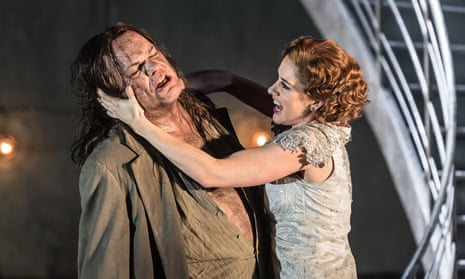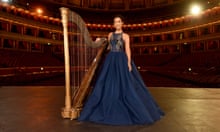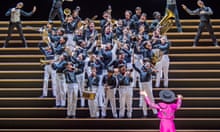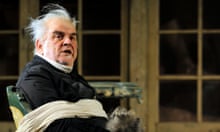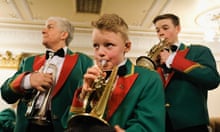The best thing I’ve ever seen, in all my long and misspent years hanging around comedy gigs, wasn’t standup. It was opera. Back in the late 90s, I was standing at the bar in one of the spit-and-stale-beer clubs where I cut my teeth, watching the MC corral the usual drunken Friday-night punters. He lighted on a woman in her early 20s at a table down the front and asked “What do you do?” “I’m an opera student,” she replied to general raucous disbelief. “Oh, yeah?” twinkled the compere, smelling pretentious blood (and what MC wouldn’t? An opera singer and a student – that, friends, is a double whammy), “Give us a song, then.” So she did. The gleeful muttering and ironic applause stuttered out when she stood and sang: Puccini’s O mio babbino caro, which, like pretty much everyone else there, I knew at that point only either as the tune from A Room With a View or an ad we couldn’t quite place.
It was incredible: the clarity of her voice, the pureness, the emotion. Such an odd and striking thing to hear in a room where most of the time what comes from the mouths of the performers is soaked in self-conscious irony. And what a reaction! I’ve never seen a four-pints-down crowd focus like that; there was a stillness to the place – a wonder, really – as she sang. And when she finished, they went crazy. Standing screaming crazy. X Factor final audience the-guy-whose-gran-died-just-won crazy.
That’s why I believe opera can be for anyone: stripped of the daffy plots, its starchier fanatics, the stereotype of bejewelled divas and manscaped divos, there’s something visceral in there, something capable of catching all of us in that music and the way it’s sung. You can feel it resonate in your chest. Because, I think, you’re listening to the most basic human tool of communication – the voice – used in an almost impossibly superhuman way.
I was by no means always an opera fan, and it was the singing that got me in the end. My grandmother and parents had taken me to see a couple of productions when I was younger in the hope of firing some latent interest, but it didn’t really grab me. Then, one day in my 20s, I heard a CD of my wife’s of Mozart’s The Magic Flute. I had no story to go on, no costumes, no set, no visuals at all, just a series of the most extraordinary voices singing insanely beautiful music. Hooked, I was. So hooked that all these years later I practically begged Glyndebourne to let me help present this weekend’s inaugural Glyndebourne Opera Cup competition for young singers.
But it’s hard to convince people who think opera probably isn’t for them to pay attention to that simple, central bit. And who can blame them? Opera comes with all the carousels in a Heathrow’s worth of baggage: it’s expensive (sure, it can be; but you can get cheaper tickets at Covent Garden than at Arsenal); you have to earn a degree in musicology and have swallowed the Penguin Dictionary of Opera in pill form to understand it (you really don’t – take it from this idiot); it’s elitist.
That last one’s the most aggravating. I mean, I know where it comes from. The popular image of opera is of dickie-bowed toffs handing over tiaras in exchange for tickets, printed on hens’ teeth, and spending the interval eating tiny sandwiches pre-chewed by poor people to minimise the effort required. And there’s no denying that there are certainly members of the opera establishment who don’t help dispel the air of snobbery and stuffiness.
But it doesn’t have to be like that. There are amazing companies, like Daisy Evans’ fabulous Silent Opera, which is reimagining and restaging works in intimate, exciting ways that feel more like a modern theatrical experience than some grand tradition. There are genius directors such as Barrie Kosky, whose productions are about thrilling the audience more than delivering revered works by sainted composers. (Treat yourself – Google his recent production of The Magic Flute to see what I mean.)
But most of all, there is an army of singers around the world who will use their astonishing voices to sing you impossible music that is by turns swoopingly romantic, terrifying, tender, electrifying, sweet and all other human emotions besides; that will affect you not because it’s sung in a velvety theatre or because it’s something you’re supposed to like to show you’re ever so clever, but because although theirs is a sound that only a handful of us can make, there’s something universal about it. It’s an espresso shot of pure humanity, opera. It’s there for everybody. All you have to do is close your eyes and listen.
